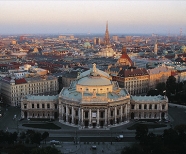What you can learn from top performing venues
In the high-stakes world of events, what separates the venues that attract a high volume of enquiries and bookings from those that struggle to gain...

Vienna is the capital and largest city of Austria and one of the nine states of Austria. Vienna is Austria’s primary city, with a population of about 1.723 million (2.4 million within the metropolitan area, more than 25% of Austria’s population), and is by far the largest city in Austria, as well as its cultural, economic, and political centre. It is the 9th-largest city by population in the European Union. Until the beginning of the 20th century it was the largest German speaking city in the world, and before the first world war and the splitting of the Austro-Hungarian empire the city had 2 million inhabitants. Vienna is host to many major international organizations, including the United Nations and OPEC. The city lies in the east of Austria and is close to the borders of the Czech Republic, Slovakia, and Hungary. These regions work together in a European Centrope border region. Along with nearby Bratislava, Vienna forms a metropolitan region with 3 million inhabitants. In 2001, the city centre was designated a UNESCO World Heritage Site.
Apart from being regarded as the City of Music because of its musical legacy, Vienna is also said to be “The City of Dreams” because it was home to the world’s first psycho-analyst Sigmund Freud, a neurologist who is well known for being one of the greatest interpreters of dreams. The City’s roots lie in early Celtic and Roman settlements that transformed into a Medieval and Baroque city, the capital of the Austro-Hungarian Empire. It is well known for playing an essential role as a leading European Music Centre, from the great age of Viennese Classicism through the early part of the 20th century. The Historic centre of Vienna is rich in architectural ensembles, including Baroque castles and gardens, as well as the late-19th-century Ringstrasse lined with grand buildings, monuments and parks.
In a 2005 study of 127 world cities, the Economist Intelligence Unit ranked the city first (in a tie with Vancouver, Canada) for quality of life (in the 2011 survey of 140 cities Vienna was ranked number two, behind Melbourne). For three consecutive years (2009–2011), the human-resource-consulting firm Mercer ranked Vienna first in its annual “Quality of Living” survey of hundreds of cities around the world. Monocle’s 2011 “Quality of Life survey” ranked Vienna sixth on a list of “the top 25 cities in the world to call home” (up from eighth in 2010).
Analytically, the city was ranked 1st globally for a culture of innovation in 2007 and 2008, and 2nd globally after Boston in 2009 from 256 cities on an analysis of 162 indicators in the Innovation Cities Index on a 3-factor score covering culture, infrastructure and markets. As a city, Vienna regularly hosts urban planning conferences and is often used as a case study by urban planners.
Each year since 2005, Vienna has been the world’s number one destination for international congresses and conventions. Vienna attracts about five million tourists a year.